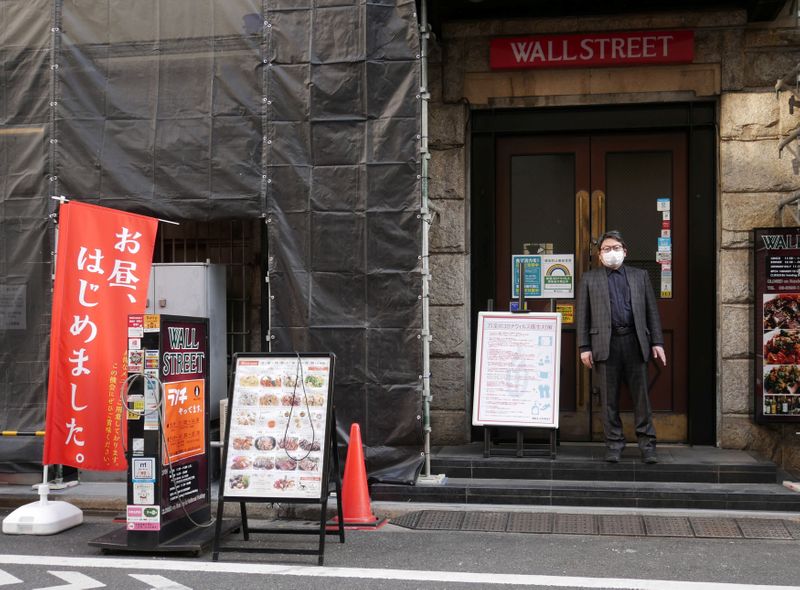By Junko Fujita
TOKYO (Reuters) - At the almost empty "Wall Street" bar and restaurant in Tokyo's Kayabacho financial district, three groups of patrons dine quietly at tables separated by partitions.
The sedate scene is a far cry from the area's heyday 30 years ago when traders flush from big wins on the nearby Tokyo Stock Exchange routinely crowded the restaurant's bar, downing glasses of premium whiskey.
Even though Japanese stocks are scaling giddy heights not seen since the asset inflation bubble of the late 1980s and early 1990s, bars and restaurants in the financial district aren't along for the ride.
Kayabacho's streets are instead eerily quiet.
"During the bubble era, people came here to drink a glass of Ballantine's 30-year-old (whisky) for 5,500 yen ($52), even when there's no seats available, just standing by the cash register," "Wall Street" owner Kenichi Inoue, 62, told Reuters.
Inoue opened the European style bar and restaurant in 1989, the year the Nikkei index hit a record peak, aiming to serve drinks and food at the affordable price of around $30 per person.
Brokers and traders packed into the bar almost every evening, with tables at the back usually filled by workers from Yamaichi Securities, then the country's fourth largest brokerage.
"It was easy to guess the size of the crowd for the evening," said Inoue. "If the market was up, I knew it would be busy."
Inoue's restaurant wasn't the only establishment to benefit during the boom. Coffee shops scattered throughout Kayabacho were filled with brokers exchanging information on the market.
The 'Tatsumi' restaurant was popular with superstitious traders because it served tempura, or deep fried vegetables and fish. The Japanese word for "deep-fry", ageru, has the same sound as the word "boost".
"Back then brokers used to come here in a group. They gave us 100,000 yen in cash in an advance," said 62-year-old owner, Masahiko Tsuda, citing a figure equivalent to around $800 at the time. "If that was not enough, they paid the difference at the end of the week."
The party came to an end when the stocks bubble burst in the early 1990s. Yamaichi was one of four major banks and brokerages that collapsed in 1997.
Compounding the market slide, the Tokyo Stock Exchange in 1999 completed a decade-long switch to electronic trading, closing the formerly bustling trading floor.
The number of brokerage employees almost halved from a peak of 170,000 nationwide in 1991 to 91,000 last year, according to the Japan Securities Dealers Association.
With them went much of the vibrancy of Kayabacho, a downturn that has been exacerbated by the coronavirus pandemic, which has led to trading restrictions on bars and restaurants across Tokyo.
REDEVELOPMENT PLANS
Redevelopment plans for Kayabacho, which houses many small and old buildings, have been in train for several years, with attempts to rebrand the area as a fintech hub. Heiwa Real Estate, the owner of the stock exchange building, plans to open a 15-storey office tower in the area later this year.
But the revamp lags the refurbishment of neighbouring districts like Marunouchi and Nihonbashi, where major property developers Mitsubishi Estate and Mitsui Fudosan have created hubs for global firms.
Adding to Kayabacho's woes, the coronavirus pandemic has dealt a blow to the real estate market across Tokyo, as more people work from home and domestic economic growth slows.
"Kayabacho's atmosphere is dark and gloomy," said Yoko Hattori, 52, the owner of a standing bar, New Kayaba. "The economy is bad. Many buildings here are old but renovation is not easy because it costs money."
Tsuda said he no longer sees people flashing lots of cash at his restaurant, while Inoue said "Wall Street" was facing the most critical time of its history.
Inoue has attempted to diversify his menu from the pasta, pizza and grilled meats that catered to mostly male stockbrokers, adding organic food and cold press juice for more health-conscious customers.

He is grateful that his own business never relied too heavily on the excesses of the bubble era: "If this had been an high-end restaurant, it would have been closed a long time ago."